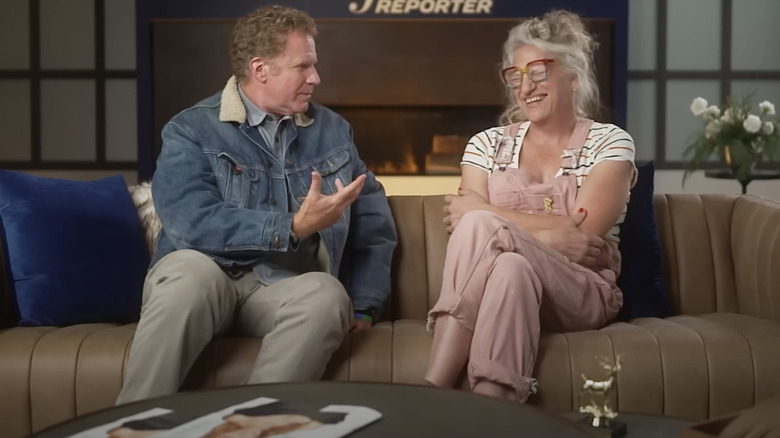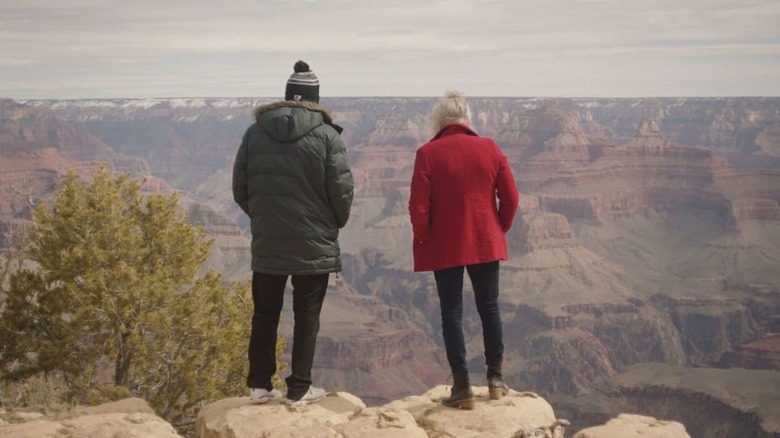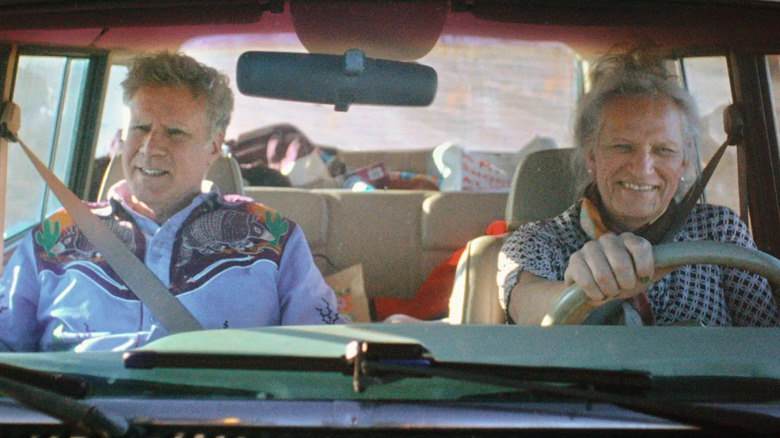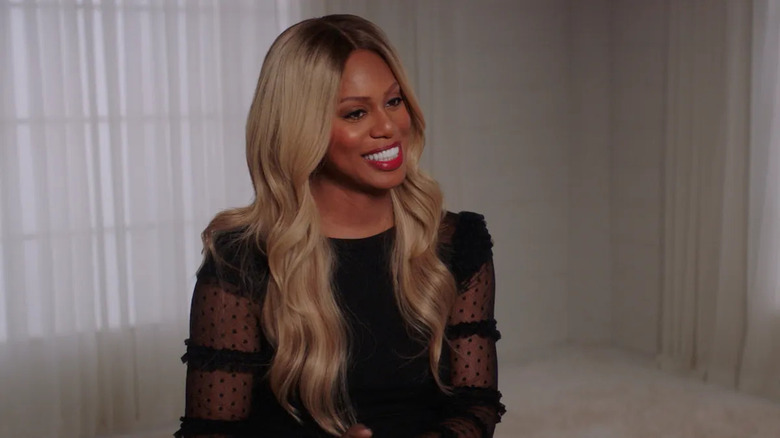Will Ferrell's Trans Documentary Will & Harper Landing At Netflix Is A Double-Edged Sword
Harper Steele is, with no exaggeration, one of my favorite comedy writers to ever do it. Not only did she write on "Saturday Night Live" from 1995-2015, the years when I was developing my own sense of humor, but she's also behind the Lifetime film "A Deadly Adoption" and the Academy Award-nominated Netflix flick, "Eurovision Song Contest: The Story of Fire Saga." She was also a writer on the "Doug" episode "Doug's Cool Shoes," which has some of the best visual joke-telling of the animated series' first season. This is to say that Steele has been formative in shaping my ability to find humor in the world around me.
Over the years, Steele has become best friends with Will Ferrell, arguably one of the most recognizable comedic actors in the world. Ferrell and Steele are frequent collaborators, and their latest project is "Will & Harper," a documentary about the pair traveling cross-country after Steele's gender-affirming transition. The film was praised following its debut at the Sundance Film Festival and sparked interest from several buyers. Ultimately, Netflix won the distribution rights, with "Barb and Star Go to Vista Del Mar" and "Too Funny to Fail" director Josh Greenbaum's return to documentary filmmaking (after last year's talking-dog flick, "Strays") quickly becoming one of the most anticipated releases of 2024.
It's difficult to explain how important "Will & Harper" has the potential to be in helping turn the tides of the general public's understanding of the transgender community. As GLAAD President and CEO Sarah Kate Ellis said during the Primetime Emmy Awards earlier this year, "What the world sees on TV directly influences how we treat each other and the decisions we make in our living rooms, schools, at work, and at the ballot box. The world urgently needs culture-changing stories about transgender people."
"Will & Harper" is a film that can do exactly that, but coming to Netflix is a double-edged sword.
Will & Harper is a vital trans film
"Will & Harper" isn't just about Will Ferrell coming to terms with his best friend transitioning, but also about the various ways people across the country perceive and act around trans people. Driving from New York to California over 17 days, the duo made a variety of pit stops along the way including hole-in-the-wall bars, diners just off the exit ramps, and high-profile events like NBA games. Steele came out at the age of 61, and as she told the AFP, wanted Ferrell to go on this journey with her in the hopes that his presence could help change the minds of people who might not otherwise be willing to even humor the idea of trans acceptance.
"A lot of bills were being passed all over the country [during filming]. It is still quite awful. It's ramping up," she said. "So I have this friend who had made movies that appeal very broadly to a lot of people [...] It was like, 'Oh, I can abuse this relationship,'" she joked. Steele was being funny with that last line, but she's also tapping into something vital. During Ellis' Emmy speech, she also mentioned "More Americans say they have seen a ghost than know a trans person. When you don't know people, it's easy to demonize them." And she's right. The overwhelming majority of people have never met a trans person in real life, and base their opinions on whatever they are told from the media. And right now, our media is pretty damn terrible for trans people.
Will Ferrell's presence serves as a Trojan horse. Transphobic people aren't going to listen to liberal pundits or "blue-haired activists" like myself (although my hair is watermelon colored, thankyouverymuch), but they might listen to the guy who gave them Buddy the Elf, Ricky Bobby, Ron Burgundy, and their favorite impressions of George W. Bush, Harry Caray, and Alex Trebek.
The people who need to see Will & Harper might actually see it now
"We are thrilled about how audiences received the movie with open arms at Sundance," the filmmakers said in a statement to Variety following the sale announcement. "It's a movie about the power of friendship and acceptance, that we hope can help shift the culture, and so we are excited to have a partner in Netflix that has the ability to reach the largest possible audience worldwide." Netflix has one of the largest reaches of most streaming services, with over 247 million paid subscribers worldwide as of Q3 2023, boasting a gain of over 8.7 million from the previous quarter, according to the company's engagement report.
Here's the thing: The people who genuinely have an interest in "Will & Harper" would gladly seek the film out regardless of how it is distributed, but that doesn't always equate to the people who need to see it. Chances are, the people most excited about this documentary are already affirming, loving allies to the transgender community or are transgender themselves. They don't need a documentary about a cis straight comedian hanging out with their trans bestie to learn empathy toward a community that is being systemically attacked in ways we haven't seen since before the Stonewall Riots.
My wife is transgender and when she and I first started dating, I was privileged enough to know that my own family would be supportive — but what about their friends, the people who had known me since infancy? Unfortunately, a lot of those people are no longer in my life because of their bigoted beliefs. I think about my in-laws, people we haven't spoken to in years because even after 15 years of my wife living her life authentically, they still refuse to understand what being transgender means and why making this change saved her life. These are people who would never in a million years willingly go to the theater and buy a ticket to see "Will & Harper," but if it's just a button click away on an app, they might.
Netflix is an epicenter of bothsidesism regarding transgender acceptance
There's a quote from Desmond Tutu that gets parrotted a lot during times of political unrest, but one that feels extremely relevant here. He said, "If you are neutral in situations of injustice, you have chosen the side of the oppressor. If an elephant has its foot on the tail of a mouse, and you say that you are neutral, the mouse will not appreciate your neutrality." What this means is that when dealing with situations of inequity, playing both sides in the interest of "staying neutral" is not neutral at all.
This is the equivalent of a teacher not holding a bully accountable because "they're entitled to their opinions," even if their bullying causes legitimate harm to another person. Netflix is an epicenter of this behavior of bothsidesism, often platforming incredible transgender documentaries like "Disclosure" (which should be viewed as mandatory film education), "The Dreamlife of Georgie Stone," and "The Dads," as well as trans-affirming narrative works like "Nimona," "Mutt," and "Sense8."
At the same time, Netflix continues to platform stand-up comics like Ricky Gervais and Dave Chappelle, who are so weirdly obsessed with dunking on trans people that it even inspired a company-wide walkout from the transgender employees at Netflix. You can't tell someone you love them and support them on one side of your mouth while praising (and paying exorbitant amounts of money to) people who will hurt them with the other and think you're doing the "right" thing.
"Will & Harper" deserves to be seen by as large of an audience as possible, and it's a bittersweet pill to swallow by admitting that Netflix is the way for this to happen. Yeah, yeah, there's no such thing as ethical consumption under capitalism, but trans people deserve to have their stories elevated by the largest powers at be without having to also sit at the same lunch table as people who make a living punching down at them.



